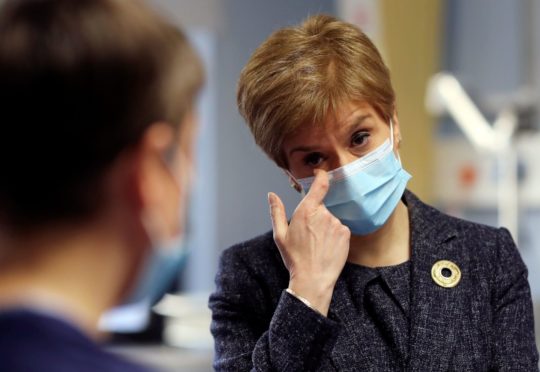In announcing Scotland’s second full lockdown on Monday, Nicola Sturgeon said there was one clear difference between the situation now and that back in March: the vaccine.
But there is another major difference as we head into the new round of restraints, and that is the public’s attitude.
When coronavirus first entered the lexicon there was genuine fear and few people challenged the extraordinary imposition of state control, in Scotland, the UK and across most of the world.
Then, little was known about the unpredictable and apparently untreatable “plague” and only the truly reckless dared to flout the rules.
Since then, we have learned much. Most significantly, Covid tends to select its victim on the basis of age and infirmity, and is much less harmful to the young.
Even the healthy middle aged have no real grounds for panic; fewer than 400 under-60s, without underlying conditions, have died from the virus since the start of the pandemic, according to NHS data for England.
Governments have erred towards caution but in the past 10 months we have had bouts of almost normal life, with the possibility of holidays abroad, nights out and one uninterrupted school term.
On top of this, effective treatments have been discovered and deployed to dramatically reduce the mortality rate from the virus, even among those admitted to intensive care.
What appeared to be a death sentence for some in March, is mercifully more of a seasonal illness today.
However, the combination of typical winter pressures on the NHS and, lately, the new Covid variant have brought us back to where we started.
As the positive test rates climbed steeply before Christmas in London and the south-east, and more slowly in other parts of the UK, Scotland included, renewed clampdowns seemed inevitable. No political leader wants to be seen to be doing nothing if hospital admissions are increasing.
The debate over how effective lockdowns have been in suppressing the virus is hardly worth revisiting at the moment, given that here we are, locked down again and unlikely to be freed in the foreseeable future.
But that does not excuse ministers from having to explain their draconian actions. People are understandably dismayed that their sacrifices so far have amounted to nothing.
The first minister decided not to wait until her latest restrictions, in force from Boxing Day, had time to take effect before switching to full lockdown.
She said this was because of the number of positive tests and her concern over the more transmissible strain of the virus.
She could not produce up-to-date figures on ICU admissions or Covid fatalities which, according to the Public Health Scotland website, reached a peak in November and have been on a downward trend since the middle of December.
These were due to be updated yesterday and may well confirm her anxieties, but the point is that she saw no need to publish evidence to justify yet another hammer blow to businesses, livelihoods, children and their education, parents, and general health and happiness.
Is it too much to ask that all available facts about the severity of the current crisis are put in the public domain?
Also, is there any reason why we cannot be given as precise as possible information about the timetable for the vaccination rollout?
Our household, presumably in common with the rest of Scotland, received a missive from the government on Monday saying we would be informed when it was our turn to be inoculated.
I won’t be in the first batch but, if all goes according to plan, should be done by early May, along with half the Scottish population.
That is all very well but it is five months away. Surely the country does not have to wait that long to return to pre-Covid levels of normality?
Boris Johnson gave hope for those in lockdown in England by promising that all priority cases would get the jab by mid-February.
Sturgeon must spell out an exit strategy from Scotland’s lockdown that offers light at the end of the tunnel.
She has managed to impose some of the UK’s toughest curbs, with scant evidence that they work, on a by and large compliant public.
She will need more than her word to enlist our further co-operation.


